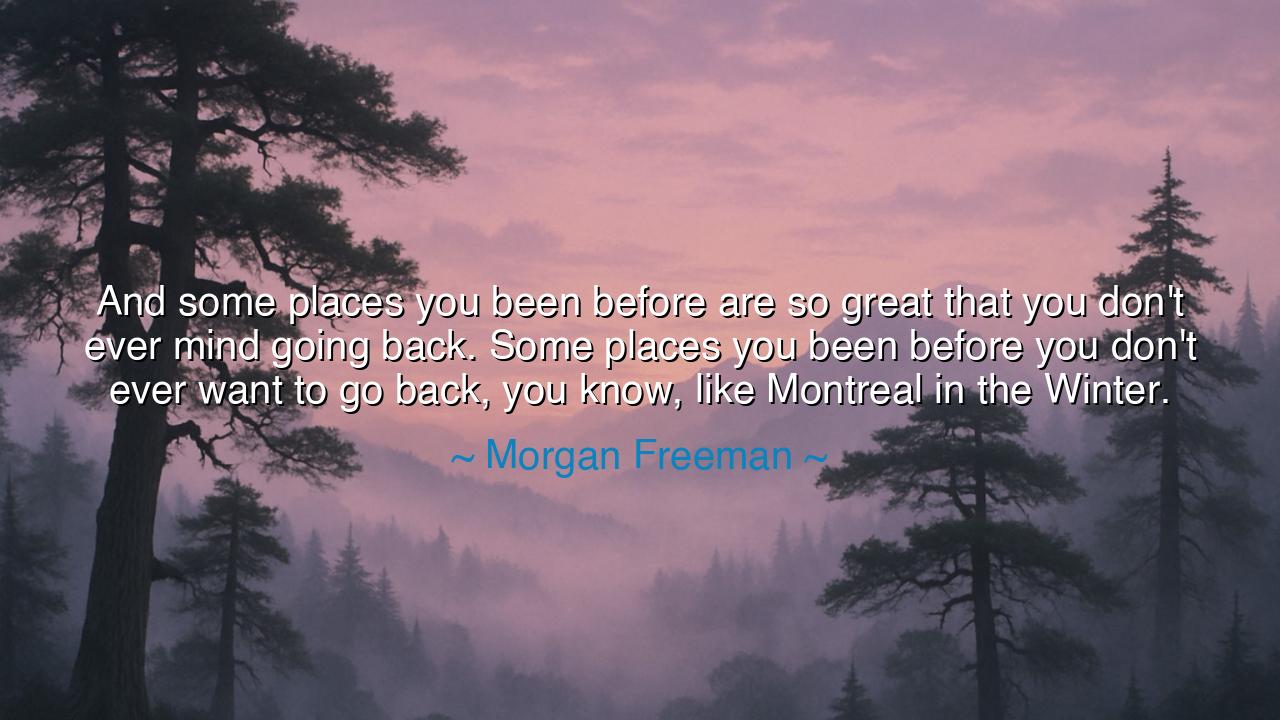
And some places you been before are so great that you don't ever
And some places you been before are so great that you don't ever mind going back. Some places you been before you don't ever want to go back, you know, like Montreal in the Winter.






“And some places you been before are so great that you don't ever mind going back. Some places you been before you don't ever want to go back, you know, like Montreal in the Winter.” — Morgan Freeman
In this reflective and quietly humorous saying, Morgan Freeman, the voice of calm wisdom and lived experience, offers a truth that resonates far beyond geography. On the surface, his words speak of places, of journeys taken and the memories they hold. But beneath this gentle simplicity lies a deeper meditation on the landscapes of life itself—on moments, people, and experiences that shape us. When Freeman speaks of “places you been before,” he is not merely recalling physical destinations; he is invoking the emotional and spiritual paths we travel in our lives. Some are so filled with beauty, love, or meaning that we long to revisit them. Others, marked by hardship or pain, we would rather leave behind, as one leaves a cold and unwelcoming winter behind for spring’s warmth.
The origin of this quote rests in Freeman’s gift for turning ordinary thoughts into reflections of timeless depth. Known for his wisdom both on and off screen, he often speaks of life as a collection of experiences—each teaching its own lesson. His mention of “Montreal in the Winter,” with its biting cold and harsh winds, stands as a symbol: some chapters in life are so unforgiving that even the memory of them chills us. Yet, his tone is not bitter; it is reflective, even amused. It is the voice of one who has learned to appreciate both warmth and frost, both joy and suffering, for each has shaped his journey.
This balance between nostalgia and caution lies at the heart of the quote. There are places we return to with joy—the hometown where laughter once echoed, the classroom where our dreams first awoke, the faces that smiled when the world felt new. Such places, whether real or remembered, become sacred within us, for they remind us of who we are at our best. Yet there are also places of sorrow—moments of failure, betrayal, or despair—where the lessons were bitterly earned. We may not wish to return to them, but even those cold landscapes are part of our map. Freeman’s humor softens the truth, but beneath it is wisdom: that both the radiant and the rough seasons are necessary for the making of a whole life.
History, too, offers this pattern. Consider the great traveler Marco Polo, who journeyed through lands of splendor and peril. Some places, like the court of Kublai Khan, filled him with wonder, inspiring tales he would retell for the rest of his life. Others tested his endurance, leaving scars he would not seek to repeat. Yet without both, his story would be incomplete. So it is with each of us: life is a vast journey across climates of the heart. Some memories are summer meadows to which we gladly return; others are winters we endure only once. The wisdom lies in knowing which to cherish and which to leave behind.
Freeman’s metaphor also speaks to growth and perspective. There are times when we must revisit even the coldest places within ourselves—to forgive, to understand, to heal. Just as Montreal’s winter, harsh though it may be, holds its own stark beauty, so too our painful memories may reveal hidden lessons when seen through the lens of time. The mature soul learns not only to seek warmth, but to find meaning in the frost. For it is often in life’s winters that character is tempered and wisdom is born.
Yet, Freeman’s tone remains grounded in humanity. His laughter in mentioning Montreal reminds us that life is not to be brooded upon, but lived with humor and grace. Even as we remember the places that froze our spirit, we can smile at the memory. To be able to laugh at the past is itself a victory—it means we have survived it. The great traveler does not curse the storm once he has reached the shore; he tells of it with a twinkle in his eye, knowing it made the calm more precious.
The lesson, then, is simple yet profound: treasure the good places, learn from the harsh ones, and walk onward with gratitude. Do not cling too tightly to joy, nor fear the memory of pain. Each “place” you have been—whether in body, heart, or mind—has contributed to the map of your becoming. Return, when you must, to the places that nourish your soul; avoid those that drain it. But above all, keep moving forward. For life is a journey of seasons, and even the coldest winter gives way to spring.
So, O traveler of this world, remember Morgan Freeman’s gentle wisdom. The path behind you holds both gardens and blizzards; the path ahead holds both again. Do not fear the return, nor the moving on. Cherish the warmth, laugh at the frost, and keep walking toward the next sunrise. For that is the art of living—to honor every place you’ve been, yet to always be ready for where life leads next.






AAdministratorAdministrator
Welcome, honored guests. Please leave a comment, we will respond soon